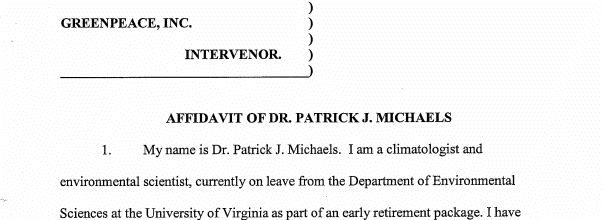This affidavit from Patrick Michaels, a known climate skeptic with deep ties to fossil fuel interests, reflects his participation in a 2007 lawsuit over Vermont’s changes to fuel emissions standards for new automobiles.
Michaels is the Director of the Center for the Study of Science at the Cato Institute, a conservative think-tank created and funded by the Koch brothers. A regular contributor on climate change issues on Forbes and Fox News, among other conservative news outlets, he is an outspoken critic of climate change science and the risks of rising greenhouse gas emissions. He once estimated that 40% of his funding comes from the oil industry.
The new emissions standards at issue in this case were adopted by Vermont in 2005, mirroring the those set by California a few years prior, which were stricter than those set by the federal government. Car dealers and manufacturers argued that under the Environmental Policy and Conservation Act (“EPCA”), fuel efficiency standards were exclusively regulated by the federal government. The manufacturers brought a claim against George Crombie, Vermont’s Secretary of Natural Resources, in a bid to keep the state from regulating greenhouse gas emissions. The automakers in the case brought in Michaels as an expert witness.
Of primary concern in Michaels’ affidavit is his desire not to publicly disclose the funders of his company, New Hope Environmental Services, “a consultancy whose mission is to publicize findings on climate change and scientific and social perspectives that may not otherwise appear in the popular literature or media.” Disclosure of funding sources had previously been a problem for Michaels and his company: “In 2006, when a $100,000 contract between New Hope and electric utility Intermountain Rural Electric Association (…) became public knowledge, a public campaign was initiated to change the composition of the Intermountain board of directors so that there would be no additional funding.” The relationship between Michaels and Intermountain Rural Electric Association (IREA) became public knowledge through a leaked memo, which also revealed a multifaceted strategy coordinated by the Competitive Enterprise Institute, Michaels, and Koch Industries, among others.
Michaels provided information on “New Hope’s funding sources and the amount of their funding” during the process of discovery of documents and during his deposition, but this information was treated as confidential. In late 2006, Greenpeace filed a motion to make the details of New Hope’s funding publicly available, leading Michaels to withdraw from the case rather than disclose the information.
In his affidavit, Michaels stated that “the global warming controversy has created an environment in which companies who wish to support New Hope’s research (…) are increasingly willing to do so only if their support remains confidential.” Referring to the IREA controversy and another 2006 leak which led to Tri-State Generation and Transmission Association, Inc. withdrawing their support from Michaels’ company, Michaels argued that “[p]ublic disclosure of a company’s funding of New Hope and its employees has already caused considerable financial loss to New Hope” and that “the Greenpeace motion, if granted, will result in New Hope losing clients.”
After Michaels, whose opinion is still considered today in lawsuits as it relates to anthropogenic climate change, withdrew from the case as expert witness, he was replaced by John Christy. Christy is also a climate-skeptic scientist who had previously contributed to “Global Warming and Other Eco-Myths (published by Competitive Enterprise Institute) and spoke at a congressional briefing in 1998 sponsored by the Cooler Heads Coalition.


